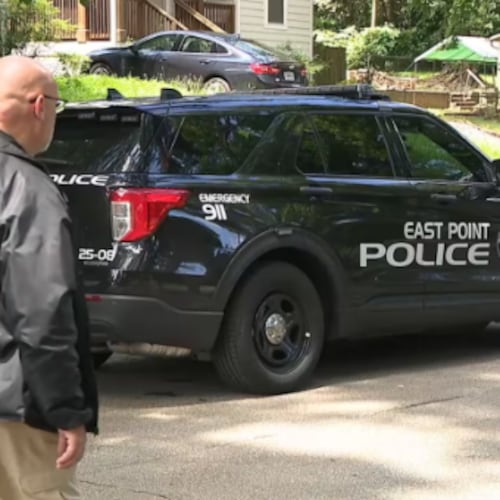In a corner of the Burns’ family living room in southwest Atlanta, images flash across a digital picture frame of precious moments with their 3-month-old daughter, Khari.
Her favorite toys sit atop a display of her belongings — from pacifiers and bibs to the pregnancy test that signaled her future arrival. Her mother, Brittany Burns, flips through a scrapbook of memories she’s put together until she reaches Khari’s obituary.
“Khari was going to do amazing things,” Brittany said. “I always told her she was going to be better than me.”
It’s been five months since her husband, Nick Burns, went to wake Khari and her older brother Eric to take them to a doctor’s appointment on a seemingly normal Friday. That’s when he discovered his infant daughter was not breathing and panic ensued.
The parents frantically tried to reach 911 without success as Brittany performed CPR on her daughter. After paramedics finally arrived and Khari was rushed to the hospital, doctors tried desperately to revive her.
The baby’s death was attributed to Sudden Infant Death Syndrome (SIDS) — a medical condition with no warning or cause. Now, the Burns’ couple is leading an effort to make sure others are more prepared than they were in case of emergency.
Khari’s parents are calling for local governments to establish an infant emergency hotline dedicated solely for children up to two years old. While advocating for heightened emergency services for infants, the family is also putting together kits with infant CPR wraps and instructions to distribute to new parents.
“I can’t bear to hear another family go through what we went through, because it’s going to feel like I was complacent and I allowed it to happen,” Brittany said.
Credit: Ben Gray
Credit: Ben Gray
About 3,400 babies across the country die suddenly and unexpectedly each year. In each of these cases, the only cause attributed is SIDS.
In Georgia, infants die from the condition at a higher rate than the national average, according to the Centers for Disease Control and Prevention.
On the morning of March 8, after Khari’s parents discovered their daughter was unresponsive in her crib, they struggled to get on the phone with a 911 operator. They say their attempts were met with a message that dispatchers were fielding a high number of calls and to stay on the line.
“I never heard anything like that ever in my entire life whenever I’ve called 911,” Nick said. “So I don’t think it processed correctly in my head. I just hung up and tried again.”
“The last thing you want to hear when you call 911 is ‘we’ll be right with you.’” he said.
A recent investigation by The Atlanta Journal-Constitution found that metro Atlanta 911 callers are often left waiting for an operator to answer. While most calls are answered within seconds, others are left on hold causing them to hang up in frustration or panic.
The AJC’s review of 911 calls found that last year in Atlanta, about 30% of emergency calls were put on hold for longer than the industry standard — which requires that nearly all calls be answered by an operator within 20 seconds.
Brittany said that law enforcement officials denied their claims that they were left on hold with a message that a dispatcher would be on the line shortly.
The family has visited both Atlanta City Council and Fulton County Commission to call on lawmakers to establish an infant emergency hotline. They’ve also hosted a series of safety training workshops where they hand out “Khari’s Calls Kits” that include CPR wraps and instructions to new parents.
“When it comes to infant safety and infant health, we want to see better for our health care system,” Brittany said. “We need to see it, because those first 12 months are terrifying — and even afterwards.”
Since Khari’s death, the couple says they’re constantly checking on their almost two-year-old son Eric, who also lost his little sister. They say he often calls out for her. Nick said that having an infant emergency kit on hand as a parent gives at least a small chance that they can survive unexpected medical emergencies.
“That’s better than nothing,” he said. “That gives the parents a fighting chance and they can say ‘I was able to try. I was able to try to help my child and I did everything I can.’”
About the Author
Keep Reading
The Latest
Featured



